How do smaller programs that become dynasties reload their squads every year?
Among several pillars of creating a successful program, there are two major ones that stand out above the rest. These factors are applicable at the high-school level, for sure, and they also apply to the collegiate level.
The first is a strong commitment to practice; meaningful and competitive practice time that simulates game conditions is critical to creating a winning spirit across an entire roster. This practice includes the regular season, but, for the most part, a strong off-season conditioning-and-skills program is where dynasties are born. The second is a commitment to allocating game time to younger players so that they can develop in a competitive environment and gain confidence.
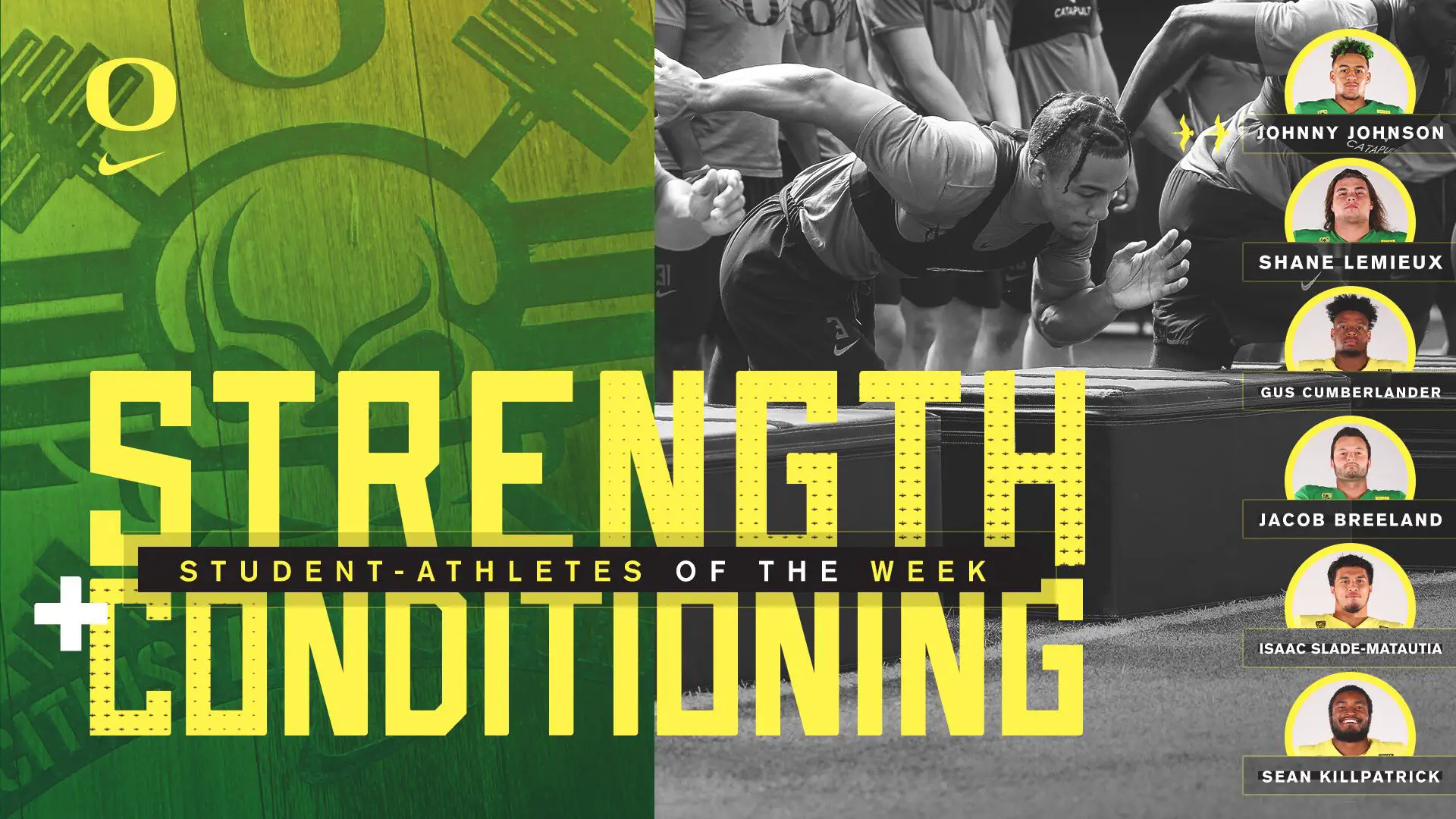
The Ducks are set in the strength and conditioning department.
With Coach Aaron Feld and the other conditioning coaches, Oregon seems to have the first element down. So, let’s explore the second element: allocating real playing time.
Roster Rotation and Allocating Playing Time
Head coaches have depth charts, but, behind the scenes, some of the more successful coaches also have succession plans for replacing graduating players with new players. Part of an aggressive succession plan is the proper allocation of game-time minutes to younger players during the season. This is a long-term approach to building a dynasty or “reloading” year after year. It also keeps players motivated during practice because they know their number will be called.
Here is a quick look at the metrics of several of Oregon’s redshirt freshmen whom we really have not seen much of yet.





Planning roster rotations years in advance and forcing oneself to allocate playing time during the season is a discipline. It also requires players to sacrifice for one another … for the team, for the legacy, and even for a dynasty.
This year, Oregon has a number of talented wide receivers who are either true freshmen or redshirt freshmen. Getting younger players in the game during blow-outs is important. Why? I’d like to introduce you to a mantra, a slogan, one burgled from Game of Thrones’ House of Stark:
“Next Year Is Coming.”
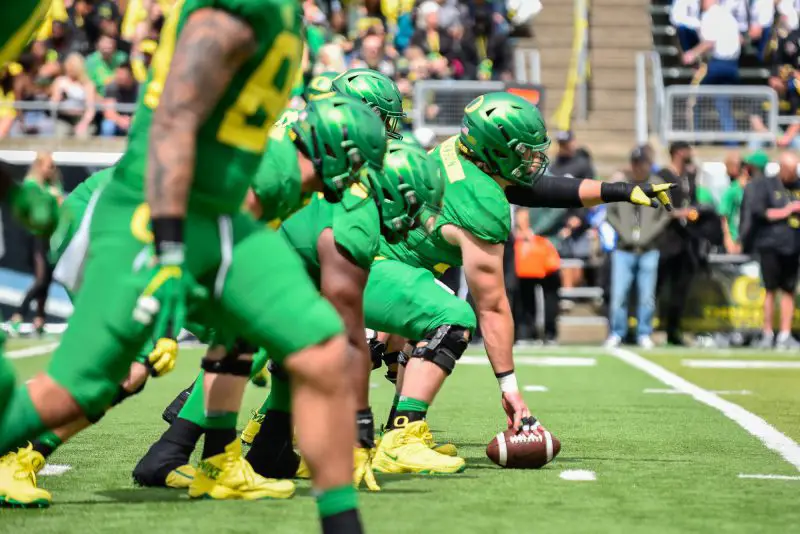
2019 Spring Game
Next Year. Fast-forward. Late January 2020. The 2019 season has just ended. On offense, our quarterback, Justin Herbert, is gone; a starting wide-receiver, Juwan Johnson, as a grad-transfer, is a one-and-done; Jaylon Redd will be our most experienced receiver returning unless he has a breakout year and vaults to the NFL as a junior. Jake Hanson, our center, will be ba-da-boo ba-da-bing: gone.

Alex Forsyth (Center) Profile
So, in 2020, we have an inexperienced quarterback, an inexperienced receiving corps and an inexperienced center, all at the same time. Uh, no. That’s not optimal. What do you do? You prepare for it this year in 2019. You solve it now as best you can with all the resources available. If the Ducks start to blow-out opponents, the master plan for next year needs to be put in play, where inexperienced receivers are put into the game early and the backup center is put in as much as possible. Prep the reload now, in 2019, because “Next Year Is Coming.“
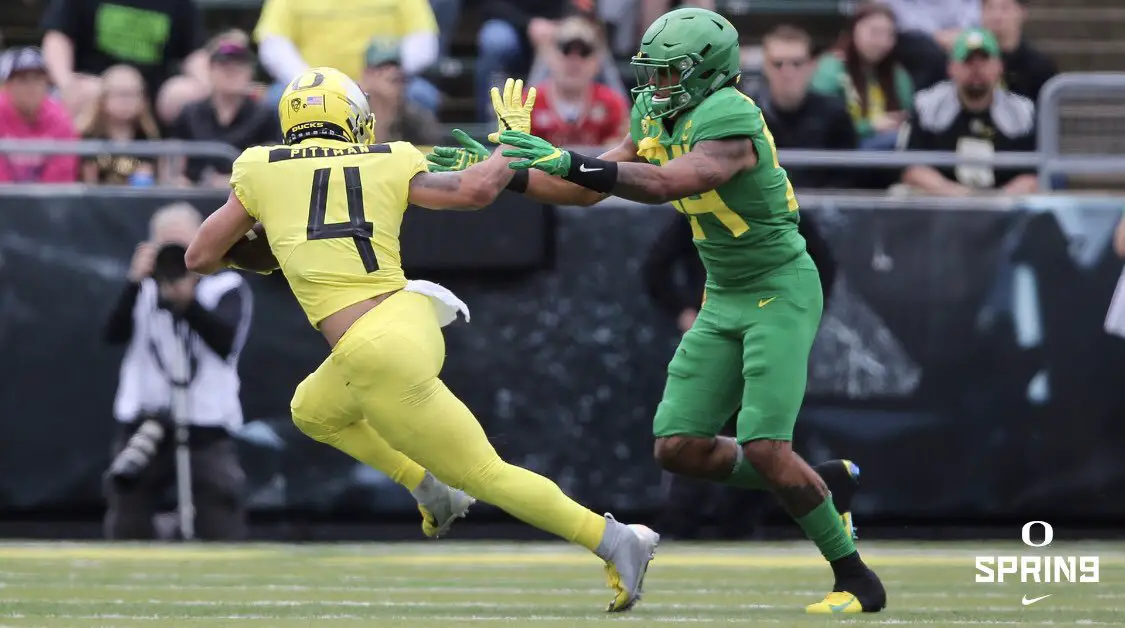
True freshman Mycah Pittman
2014 Case Study: Quarterback, Marcus Mariota
Let me dial you back half a decade to Mark Helfrich time. 2014 season. Electric uniforms. The blur. Oregon football glory in all its gaga. Marcus Mariota’s last year. The Quack Attack is chugging along like clockwork, blowing out teams in style: 62-13, 48-14, 45-20, 45-16, 44-10, 47-19, 51-13, 59-20. The Duck mascot is a national rage with Lee Corso putting on a Duckhead on ESPN’s Game Day. But I want you to whisper to yourself, “Next Year Is Coming.”
In the post-Mariota era, who is Oregon’s quarterback going to be the next year in 2015? With the glut of blow-outs, how are we preparing for that transition, Helfrich?
On the 2014 roster, there’s redshirt sophomore Jeff Lockie, who will complete 71% of his passes over two years in reserve, and true freshman Morgan Mahalak as the other backup quarterback. That 71% stat for Lockie might seem impressive, except that in Oregon’s blow-outs in 2013 and 2014, Lockie got less than two passing attempts per game (Lockie had only 41 passing attempts over two seasons as a backup). Let that sink in. Oregon is blowing out teams by 30, 40, 50 points and the backup quarterback is not getting any real game experience.
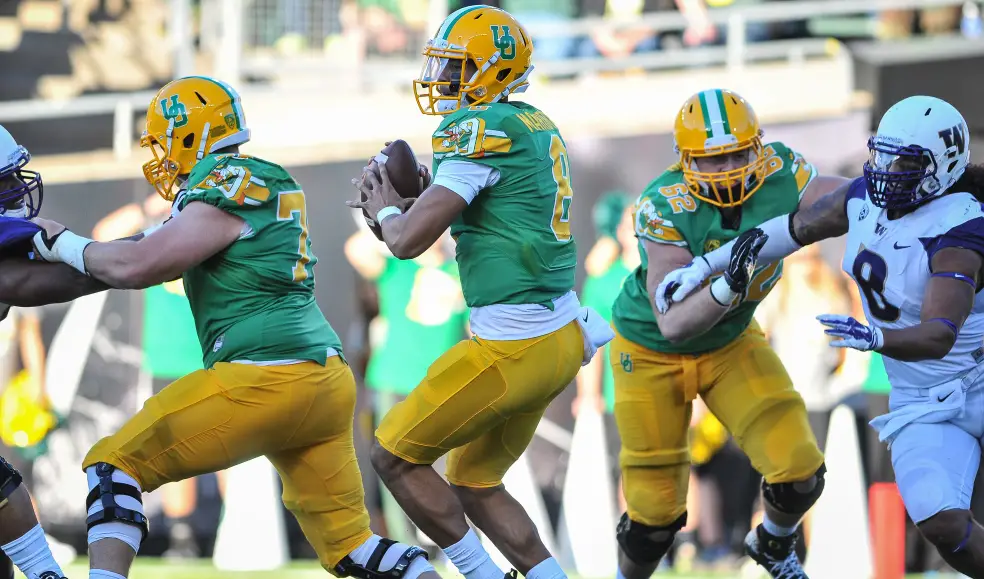
Mariota won the Heisman Trophy Award in 2014.
The Hard Question
So, here’s the reality of getting younger players game-time experience, and it is a real, real issue for a head coach: an experienced player has to sacrifice in order to build a dynasty. That senior leadership that is talked about is not a mirage. How do you take a smaller football program with a nice brand and reload year after year? I believe, for Oregon, you can evaluate how successful your strategy would be by answering the following question as a head coach:
Would you sacrifice the Heisman Trophy for Mariota in order to develop your backup quarterback for next year?
Yeah, that dynasty that you want, it comes at a price. (FishDuck.com has an article called the Post-Heisman Slump.) For a dynasty to happen, a head coach has to sell a culture where players are a part of something bigger than themselves. A smaller school like Oregon has to use blow-outs when no one is paying attention to get younger players critical real-game experience, playing time that will motivate them and give them confidence.
2019: Quarterback, Justin Herbert
This season, there are some tough choices. How does a head coach create a powerhouse at Oregon? One thing a head coach has to do is sell something that every retired player will tell you is what they miss the most about playing the game: the locker-room, being with the team, being a part of something bigger than oneself. This is about camaraderie.
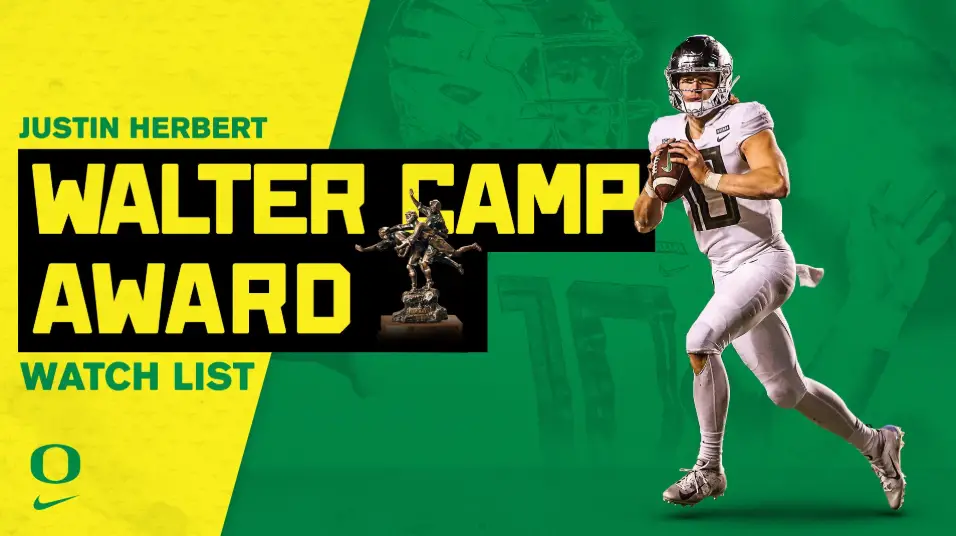
Justin Herbert is up for numerous awards.
Dynasties are not all about personal awards. A long-term dynasty in a smaller program is built, year after year, by experienced players, ensconced leaders of a team, who sacrifice of themselves of their playing time to get the younger players ready to go. That’s how a reload works when it’s firing on all cylinders. It’s a head coach mentality that lives inside the players who are leaders on the team.
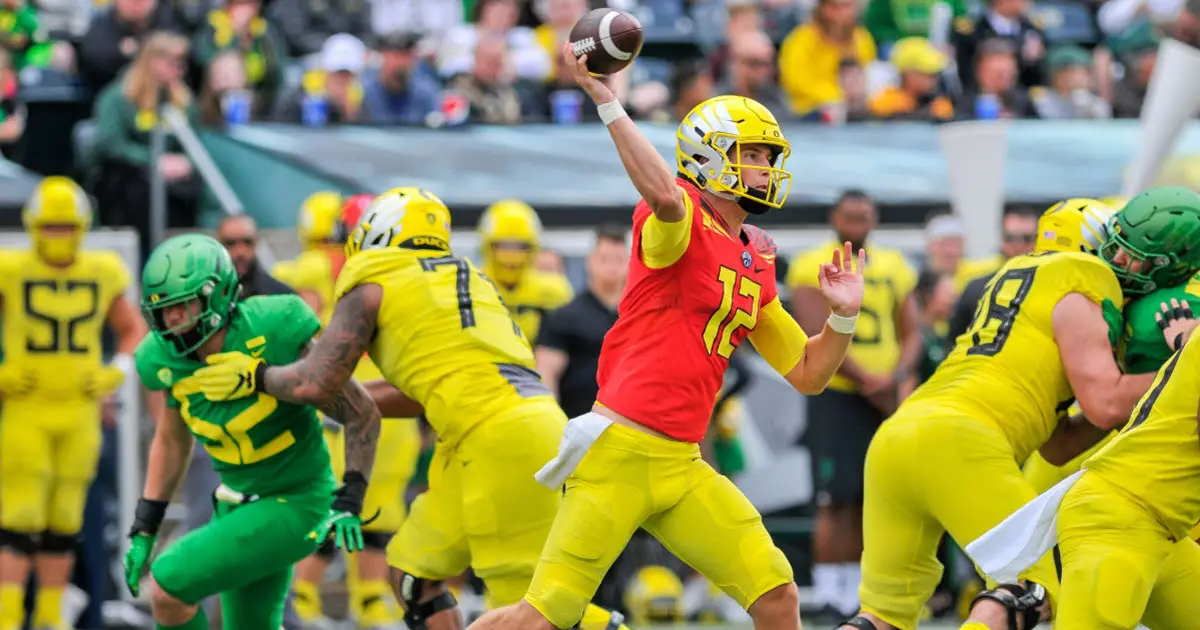
Tyler Shough in the Spring Game
The head coach sells a future that comes at a cost. What’s the benefit to a player? It’s likely not a Heisman. It is what I talked about: being a part of something that is bigger than oneself. It’s being a part of something the rest of one’s life, something to come back to, banners to see hanging that you were a part of, the swell of pride, the beauty of the glory that continues, a river that you are a part of that keeps flowing. It is the satisfaction that everyone sacrificed to make everyone else better, and that included giving up playing time and stats so that a younger player could step in and be successful.

Next Year Is Coming
Look at our receivers: if Redd has a breakout season, and we hope he does, would you pull him in the second quarter of a game that’s already decided and get a couple of younger receivers as many reps as possible with the starters? Would you pull Herbert early in the third quarter of a blow-out and put in Shough to give him meaningful reps, say, even putting Redd back in for a series to give Shough an experienced receiver to throw to so the momentum continues?
Look at our linemen? Would you pull Hanson and give meaningful snaps throughout the year to Alex Forsyth or Ryan Walk so that one will be ready once Hanson graduates? (Remember the mis-snaps in the 2015 Alamo Bowl?) These are the types of decisions a head coach needs to make for the 2019 season to prep his team for 2020.
During this 2019 season, look at our older players in a blow-out, and then look at our younger roster and repeat to yourself:
Next Year Is Coming.
Ugly Duckling
Migrating West Top Photo From OregonFBequip on Twitter

Chris Brouilette, the FishDuck.com Volunteer editor for this article, is a current student at the University of Oregon from Sterling, Illinois.
Ugly Duckling was part of a flock that migrated from east of the Cascades many seasons ago, was raised in Willamette Valley Ponds, and is proud to be part of the green and yellow.


